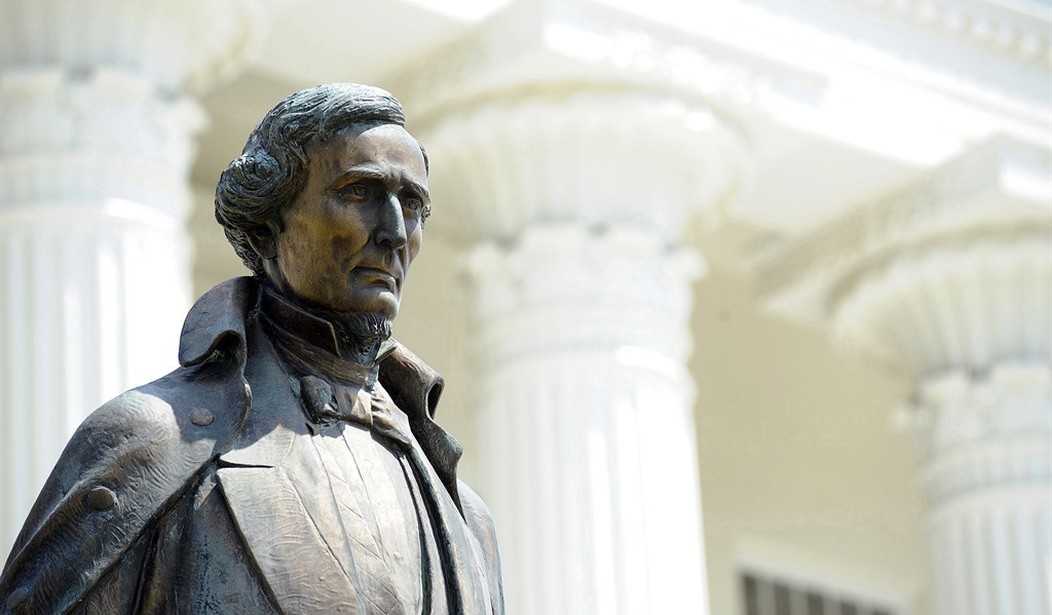Evangelical author and pastor Jim Wallis has referred to slavery as America's "original sin." That is a powerful reference, fraught with significance. The Old Testament notion of original sin is representative and collective; the sinful choice of the first humans condemned all humans to sinfulness and separation from God. To continue the analogy, if slavery is America's original sin, then anyone who participated in it or who has profited from it is tainted by it. All Americans, by extension, would bear guilt. Some version of that argument is often among the justifications for reparations.
While the debate about reparations continues to simmer quietly, questions about how to address the history of slavery in the United States remain at the forefront of public conversations. Specifically, how should we remember the notable people in our past who directly participated in slavery, defended the system in which it thrived, or were less vocal about its abolition than we think they ought to have been?
Recent events in New Orleans demonstrate the complex moral calculus in reconciling the preservation of history with the desire to take a public position on historical events.
Last week, the city of New Orleans removed the last of four monuments that traced their history to the Confederacy. An obelisk commemorating the Battle of Liberty Place was removed on April 24 of this year. Statues of Confederate President Jefferson Davis and Confederate Brigadier General P.G.T. Beauregard were taken down on May 11 and May 17, respectively. The statue of Confederate General Robert E. Lee, for whom New Orleans' Lee Circle was named, was taken down on May 19.
The decision to remove these monuments was made by the New Orleans city council, at the urging of its present mayor, Mitch Landrieu, who has spoken out forcefully and repeatedly in favor of the decision. In an address given on the day that Lee's statue was removed, Landrieu characterized the figures as commemorating "a lost cause," the rewriting of history, and the hiding of the truth.
Recommended
A complete description of Davis, Beauregard and Lee is well beyond the scope of this piece. Suffice it to say that it is a gross oversimplification to associate them only with the Confederacy or the Civil War. Beauregard and Lee, for example, both served the United States honorably in the Mexican-American War. Lee had opposed secession and originally sought a commission in the Union Army. Are they to be defined exclusively by their relationship to the Confederacy?
Nor is this a statement unique to the individuals commemorated by the removed statues. Landrieu has said that these men don't belong on pedestals. What is harder to determine is who does.
Our first president, George Washington, was a slaveholder, as were presidents Thomas Jefferson, James Madison, James Monroe, Andrew Jackson, Martin Van Buren, William Henry Harrison, John Tyler, James K. Polk, Zachary Taylor, Andrew Johnson and (former Union general) Ulysses S. Grant. Other founders, like Benjamin Franklin and Patrick Henry, also owned slaves.
Must every statue of these men come down? What about the cities, streets, schools and other institutions named for them? Mount Rushmore?
If statues of persons who defended or participated in a system with slavery should be removed, then what of the buildings built by slaves? According to numerous sources, slave labor was used to build the White House, the United States Capitol, and Jefferson's historic home, Monticello. Countless other structures in this country were built in whole or in part by slaves. Should all these structures be destroyed?
And as loathsome as slavery was (and is), it's problematic to single it out. There is virtually nothing in America's history -- or that of any other human institution -- that did not have its dark side. The Westward Expansion created the nation we now know but dealt a heavy blow to Native American tribes. Immigration created incredible opportunities but many languished in abject poverty. The Industrial Revolution brought progress and liberation from mindless toil but contributed to the creation of slums, despicable work conditions and pollution.
Which champions of knowledge, expansion, innovation or industrialization still merit recognition?
The moral calculus of history's preservation is complex because human beings themselves are. Circumstances change, and perceptions change with them. Even today we have a tendency to overlook the moral failings of political and social leaders when the perception is that those shortcomings are outweighed by better attributes. Are we wrong to do so? Should we remove the tributes around the world to John F. Kennedy, Dwight D. Eisenhower or Martin Luther King Jr. because they were reputedly unfaithful to their wives?
If the standard is perfection, then none will be found worthy.
We are assured that our history will not be lost. On the day that the statue of Robert E. Lee was removed, Mayor Landrieu said, "There is a difference between the remembrance of history and the reverence of it."
Absolutely true. But even remembrance requires effort and artifact. How much of either will be permitted?

























Join the conversation as a VIP Member